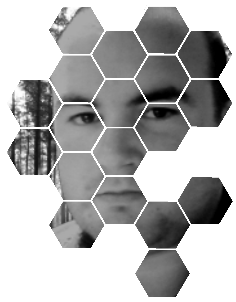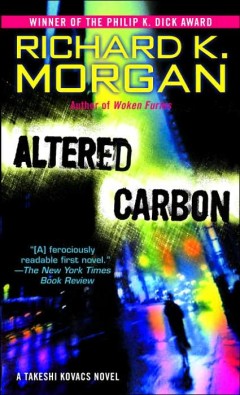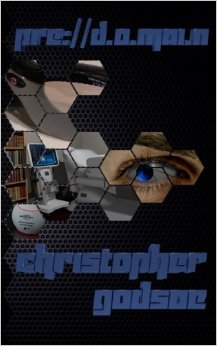With his sci-fi thriller pre://do.mai.n, author Christopher Godsoe isn’t interested in painting a dystopian vision for the future — society as we know it can be ugly enough. That is, until you’re prepared to fight for it.
In part 2 of this wide-ranging interview, Chris talks about his influences as a writer and his experiences bringing the book to life over the course of the past year.
pre://d.o.mai.n • By Christoper Godsoe • 395pp • Released December 2nd, 2013
Note: This is my final in a series of three posts covering the launch of Christopher Godsoe’s new sci-fi thriller, pre://do.mai.n, available online. Read my review of pre://d.o.mai.n, and part 1 of my interview with Chris. Today, part 2 of my interview, covering Chris’ experiences writing the book.
Aspiring writers are often intimated by how to begin writing, particularly while balancing a full-time job, family and friends, and other commitments. I occasionally hear the old line repeated that it’s only a “lucky” or “connected” few who actually produce writing, though most writers who actually try know it’s a lot more about effort than a lucky break. Looking back on how you brought a nearly 400-page novel to life, how did you start? What helped keep you going?

The advice most proven writers give to aspiring ones sounds a lot like this-”Write”. It comes across a lot like, “Get out of here kid, stop bothering me. Can’t you see I’m busy?” I’m sure some of them even mean it that way. Most of them don’t, they’re just trying to let people know that there isn’t really any shortcut. Writing is a slog, it’s a marathon, and the path to it’s summit is littered with the corpses of the millions of people out there that have said, “You know what? I bet I could write a novel.”
Anyone can write a novel. Completing one requires no physical gifts outside of the average human, and since everyone can (meaning there is nothing preventing them from doing so), they assume that anyone can (meaning that it’s easy). It can be unnerving, but there’s still a large divide between those that can and those that do. Not everyone enjoys writing, especially to the extent that it takes to see a book through to completion. It sounds romantic, slaving away in silence only to emerge with a stack of pages months later, unequivocal proof at how brilliant you are. The reality is a lot different.
My advice is for anyone that feels like they should write a book is to try it. It’s not for everyone, and in that I mean that not everyone enjoys the process as much as they think they will. The bar of entry is low, meaning you likely already have everything you need to create a book and publish it now with the advent of self/independent publishing. The largest barrier for new writers is the same as it always has been- the actual writing.
As if writing itself isn’t a solitary and difficult enough process, a sensitive topic among writers is the manner in which written work is published: Even with the proliferation of devices like the Kindle, iPad, and smartphones — and with the success of self-published books like “50 Shades of Gray” — many authors still choose the traditional printed publishing route over self-publishing, whether for reasons of prestige, validation, the potential for more money, or just because “that’s how it’s done”. Do you feel self-publishing is still not as desirable as having work bought by a traditional/print publishing house? If so, why not? Do you expect that self-publishing will become the norm, even for bigger-name authors?
I think there are perks to either path. I sent this book out to several agents via query letter. It was rejected by every one of them that saw fit to grace me with a response. A funny thing happened though, while I was waiting to hear back from them. I started thinking about all of the ways I could benefit from traditional publishing (such as the prestige and validation), and realized that what I was giving up was actually more valuable to me than what I would be getting in return. The cash earned is roughly comparable. Sure you may sell more copies with a traditional publisher backing you, but you will also make considerably less per copy, and you also forfeit most of the rights you have to the story.
If your book takes off, and a business opportunity arises from that down the road, such as a film deal or a video game company wants to use the world you created, it’s more likely than not that they will be negotiating with (and paying) the publishing house you signed with. Signing with a traditional publisher is great, don’t get me wrong, but it’s not the best fit for everyone. This way, if I decide I want to partner with an artist to produce a graphic novel version of pre://d.o.mai.n down the road, I can do that. If I want to release the next novel episodically, I can do that. I don’t have to ask permission from my publisher.
Who are your influences, particularly for this book (sci-fi or otherwise)?
The big ones are Richard K Morgan, Daniel Suarez, Neal Stephenson, William Gibson, Hugh Howey, and Chuck Palahniuk. I am also a huge fan of the short stories of Karl Schroeder (his stories in MetaTropolis are brilliant), but haven’t had a chance yet to check out his novels.
Relatedly, what authors and/or books people should check out if they like pre://d.o.mai.n?

Science fiction seems to be in the midst of a resurgence of popularity across media as part of a larger renaissance of “geek” culture. Do you see any other implications for this popularity outside of entertainment? Will it help people become more self-reflective, or skeptical of the power structures of society?
I think there is a lot of truth in science fiction, and there always has been. No other form of fiction devotes itself so heavily to predicting the future, in my opinion. I feel that science fiction is often a product of the time in which it is conceived, and with recent stories like “V for Vendetta”, the Silo series (Wool, Shift, and Dust), the Matrix movies, the Terminator films, etc, it’s obvious a lot of science fiction creators have a less than stellar opinion of the current power structures of our planet and where they are pushing us.
It’s a bit of a “chicken or the egg” thing, really. Are people feeling that the current power structure is corrupt, and that mistrust is feeding into their art through science fiction, or is science fiction helping to cultivate these ideas? I’m more inclined to believe the former, though I do feel like life follows art to some extent. People are giving geek culture more play than they ever have, and are learning that it has some pretty interesting things to say about the world. The biggest grossing films for the past few summers usually have some pretty heavy science fiction influences, and more and more often people are choosing science fiction as a place to spend their entertainment dollar. In a capitalistic society such as ours, it’s as good an indication as any that we are entering a new golden age of geek culture, where it’s far more acceptable to be a geek than it ever has in the past. Kids are far less likely to get picked on for wearing shirts with comic book characters on them, or Star Trek, etc. That, in and of itself is a huge shift in the way the public sees geeks. The problem isn’t so much that geeks are insulted anymore, we’ve almost reached the point where people are trying to inflate their geek credentials in order to be accepted. The geeks are taking over.
One of my favorite meta topics about writers and writing are the routines of creating and editing. Can you share your own personal habits for writing and editing: Mornings? Late nights? Longhand? Only with headphones?
I write primarily late at night. I’m a bit of a night owl, and I can’t say with any certainty if writing early in the morning would work for me, because I’ve never tried it. In talking with other authors, I hear that a lot of them write early in the day. They start the day off with coffee or something caffeinated, and try to get in their work before they start anything else. It’s not something that works for me, I don’t think enough caffeine exists to get my mind into a serviceable state before I need to be doing other things.
As far as music is concerned, sometimes I listen to it while writing, but it varies based on what kind of a mood I’m going for. I’ve taken to creating what I call “mood playlists” on Spotify, each containing music evoking certain emotions, and select which one to listen to based on the mood of the specific scene I’m writing. If I’m writing a sad scene, I’ll listen to music like “Mad World” by Gary Jules, something by Blue October, “Imagine” by John Lennon, or “Same Old Lang Syne” by Dan Fogelberg, which is an incredibly lonely, sad song.
If I’m writing an action scene, I might go for something with more energy, such as something by The Crystal Method, Rage Against the Machine, or Skrillex. It changes constantly based on mood, and sometimes I don’t listen to any at all. I try to avoid headphones unless there’s a lot of background noise, I just keep the volume low enough to hear the melody without being able to understand the lyrics. I like to think the meaning gets through subliminally. “Mood by Osmosis,” if you will.
By introducing fantasy worlds and futuristic technology, science fiction as a genre enables a writer to subtly comment on life in the present, demonstrating that while settings and tools may change, people will always face similar (and sometimes new) human challenges. Did you choose science fiction as a means to reflect on present-day challenges? Did you start with the themes, and then decide science fiction was the format you wanted to express them in?
I think science fiction is fascinating as a genre in it’s ability to comment on the possibilities of the future. It’s the main purpose of the genre, as far as I’m concerned, to forecast what might come to be one day. Alot of that involves extrapolating what we are dealing with now, taking it to one of many logical conclusions to illustrate what could come to pass if we continue on in a certain direction. It’s a powerful thing, the ability to tell a tale while influencing the next generation to make better choices, and one I don’t take lightly. I know not everything I try to say will sink in, and many readers will gloss over those parts of the story in lieu of getting to the action, but it’s there for those that are receptive to it.
Karl Schroeder does a great job of tackling things like that in the stories he has contributed for the MetaTropolis audiobooks. His writing on Augmented Reality in “To Hie from Far Celenia” is genius. While I didn’t discover it until I had nearly finished pre://d.o.mai.n, he brings up a lot of good points that will inspire new choices in my writing as I continue this series. I recommend anyone interested in new ideas to check out those audiobooks (They only exist in audiobook format). In MetaTropolis: Cascadia, he delves into the “Internet of Things”, as well as explores the concept of a commodities based currency with expiration dates printed on each bill. I can’t say what making a change like that could do to our economy, but it would certainly keep the currency flowing through it at a steady clip.
His writing on “The Internet of Things” in Daodan is impressive as well, because some of what he goes into there is actually beginning, with the Animal Rights movement, and one could see how-even with no direct input from the animals-their rights could be leveraged to great effect. Science Fiction is cyclical in nature, what today is far fetched and “Sci-Fi”, will tomorrow inspire scientists and engineers to make real. Tomorrows Science Fiction will inspire the next generation to move the needle even further, and so on, and so on. In many ways, Science Fiction gives our frenetic technological advancement a constantly moving goalpost to strive for. We’re all still waiting for our hoverboards, though.
A major theme in the book is tenacity: Miles continues to stubbornly work to save his mother, almost relishing defeat and using them as fuel to continue his quest, even if he allows himself moments of bitterness amidst his generally optimistic demeanor. Does that arc reflect your own challenges as a writer? Do you think it’s a requirement of success that it be achieved through adversity?
I haven’t really had any adversity as a writer, so far at least. I don’t have sizable expectations on my work so far, and very much look at it writing to amuse myself. I write to tell the stories I want to see told, that I don’t see anyone else telling. If other people enjoy them, It does feed my drive to write more, but I’m pretty much powerless at this point to stop writing now. I took the incredibly arrogant step of plotting out the remaining books in this series to counteract the narrative evolving in my head should any one of the novels “luck out” and scrape together a following. I didn’t want to make the same mistake I think the Matrix films did, where after the first film the directors may have tried to outsmart themselves. I wanted to have a clear sense of where everything was going, so that the input of others wouldn’t persuade me into changing the story to what I thought they might want to read.

Anything more than that, and I think you are opening yourself up to the randomness of Mother Nature and the Universe, which has already made it’s own plans. If you think you’ve considerable enough for them to account for you, you will at some point be disappointed. That line of thought contributed heavily to the creation of “The Flow”, in pre://d.o.mai.n.
We’re told to “write what we know”. If you can share, what parts of your own personal experiences went into telling Miles’ story? Other than, of course, having a computer-generated member of the opposite sex awake you in the middle of the night —because I think we’ve all had that happen to us at one point or another.
Yeah, it messes up your whole night’s worth of sleep when it happens, too. I drew a lot from personal experience, and not just for Miles. I patterned the character of Skyler on my son, because I hear a lot about how Orson Scott Card catches flack for overestimating the intellect of younger children, so I wanted to base the character on someone real. My son swears a lot less than Skyler in the book, however, so I did take liberties with him.
For Miles and Tobin Maldovan, I took parts of myself, emotions I recall from my divorce a few years back, and used them. Miles’ awkwardness at being around his ex girlfriend was certainly something I experienced shortly after the divorce, though I outgrew that in due time like we all do. Tobin Maldovan is similar. I drew from my experiences during that time, back when I was going through the emotions of rediscovering myself, when a sizable part of my life had to change. In his instance, it’s his discharge from the military, but I think if you strip out all of the personal emotion, the losses are surprisingly similar. I couldn’t have done that shortly after the divorce, separate the emotions of it all, but I think that’s part of my process-giving things time to appear on their own time. I avoid forcing things, writing just to write, and when the parts of the story that are hard to write become easy, that’s when I know they are ready to be written. I may never be the author that can crank out a book every three months, but I’m not sure I want to be. I’d rather write a book a year that I can be really happy with, and that says what I want it to say.


Leave a Reply